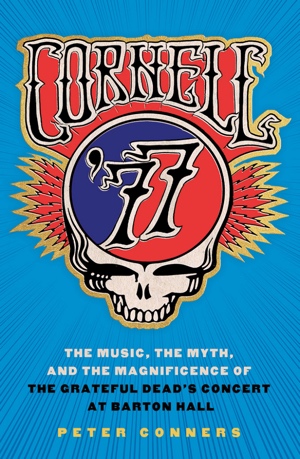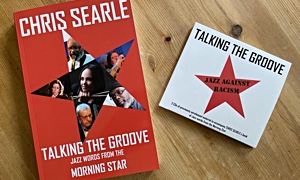Home » Jazz Articles » Book Review » Cornell '77: The Music, the Myth, and the Magnificence o...
Cornell '77: The Music, the Myth, and the Magnificence of the Grateful Dead's Concert at Barton Hall
 Cornell '77: The Music, the Myth, and the Magnificence of the Grateful Dead's Concert at Barton Hall
Cornell '77: The Music, the Myth, and the Magnificence of the Grateful Dead's Concert at Barton Hall Peter Conners
232 Pages
ISBN: #150170432X
Cornell University Press
2017
If it strains the credulity of even the most devout Deadhead that a whole book has been devoted to a single show of this iconic band, it may be even more startling that Peter Conners validates the concept with the combination of his skewed sense of humor and careful scholarship. From the very foreword of Cornell '77, then on to the interviews and observations the author offers throughout (most of ) the remainder of his work, he alternately and artfully piques curiosity, then satisfies it.
Like so many Grateful Dead-related projects, Cornell '77 is an idea just goofy enough to work. Peter Conners' writing is the silver lining of intelligence in this book and the author carries on stylishly entertaining the reader as he enacts the ratification of his premise: that this late Seventies spring show at the institution of higher learning in Ithaca, New York was/is the ultimate Grateful Dead performance. More importantly still, this self-avowed Deadhead's colloquial writing tone belies his learned approach to his subject(s) even as his style manifests something of a filmmaker's approach to his narrative.
As a result, it only makes sense for him to trace the roots of the taping phenomenon nurtured by the Dead (after the group fought it only so long) and in doing so, take a short but nonetheless enlightening side-trip into the life of Owsley "Bear" Stanley, whose demanding approach to sonic excellence was equaled only by his scrupulous and creative approach to making LSD (and his disinclination to accede to social etiquette). Conners creates suspense in this chapter after vividly setting the stage for the May 8, 1977 concert, before which Deadheads had to endure unseasonably cold wet weather prior to the event but after which were blessed by the seemingly magical appearance of snowfall.
It is the little things that distinguish Peter Conners' book in such a way it becomes a deserved entry into the long-term lexicon of the Grateful Dead. For instance, his casual insertion of the phrase 'exactly perfect' echoes a phrase Bob Weir often referenced in regards to the band's on-stage sound, but because the author doesn't allude to the history of the verbiage, it's all the more effective. And even though only twelve pages of photos appear here, the combination of stage shots, reprints of memorabilia and articles plus some images of the Ithaca area, snowbound and otherwise, heighten a dream- like quality that arises from this story.
And there's a deceptively whimsical air the writer maintains through most of Cornell '77 that belies his otherwise serious approach to the occasion as a significant milestone in the history of the Grateful Dead. Fully aware the designation of 'greatest show ever' is and will always be, subject to discussion-an ongoing dialogue in the band's community he documents to significant degree-Peter Conners avoids radiating much of the air of a nerd/geek about the place this concert holds in the hallowed story of this influential group.
That said, it's borderline jarring to read his song-by-song account of the performance itself. In marked contrast to the rest of this book, not to mention his short treatise on the song "Dark Star," Conner's prose becomes stilted and often overwritten in this section; if it were not for the justifiably reverential attention he affords the recording expertise of Betty Cantor-Jackson, Conners would end up giving no real indication why this particular show has become so revered in Grateful Dead lore. Adding in songs stats only adds to the clunkiness of this segment: he might better have included those details in a separate annotated setlist in its own section at the end of the book.
Given Peter Conners' enthusiasm for his subject, the temptation is understandable to explicate the ineffable in the music the Grateful Dead made this fateful night, so he can be forgiven for lapses into near purple prose, especially because, in the chapters immediately following, he regains his lucidity as a writer and his eye for detail as a scholar. The clarity of the backstory he offers on the so-called 'Betty Boards,' from which comes the recording of Cornell '77, (Rhino, 2017) among others, enhances his description of the circuitous route the tapes took in finding their way into the hands of the Dead organization.
Likewise, the capsule histories of other major players in their release, including the aforementioned engineer/recordist herself, Mark Pinkus of Rhino Records and director of the Dead archive Nicholas Meriwether, give objective credibility to the main story-line. These may, in fact, be the weightiest portions of a streamlined book in which the density of information it holds belies its relatively truncated length of 213 pages (including epilogue, data and notes).
Peter Conners' 'late to the party' aside about the Cornell '77 recording's 2011 inclusion into the Library of Congress' National Recording Registry reaffirms his refusal to take any aspect of this tale of unlimited devotion too seriously. Still, the publication of the book through Cornell University itself delivers affirmation of the lofty notion in this book's subtitle. As a result, this document of The Music, the Myth, and the Magnificence of the Grateful Dead's Concert at Barton Hall becomes one more signpost along a golden road that, by book's end, the author rightfully implies has no end in sight.
< Previous
Mata Hati
Next >
Donora Autumn
Comments
About Grateful Dead
Instrument: Band / ensemble / orchestra
Related Articles | Concerts | Albums | Photos | Similar ToTags
For the Love of Jazz
 All About Jazz has been a pillar of jazz since 1995, championing it as an art form and, more importantly, supporting the musicians who create it. Our enduring commitment has made "AAJ" one of the most culturally important websites of its kind, read by hundreds of thousands of fans, musicians and industry figures every month.
All About Jazz has been a pillar of jazz since 1995, championing it as an art form and, more importantly, supporting the musicians who create it. Our enduring commitment has made "AAJ" one of the most culturally important websites of its kind, read by hundreds of thousands of fans, musicians and industry figures every month.























